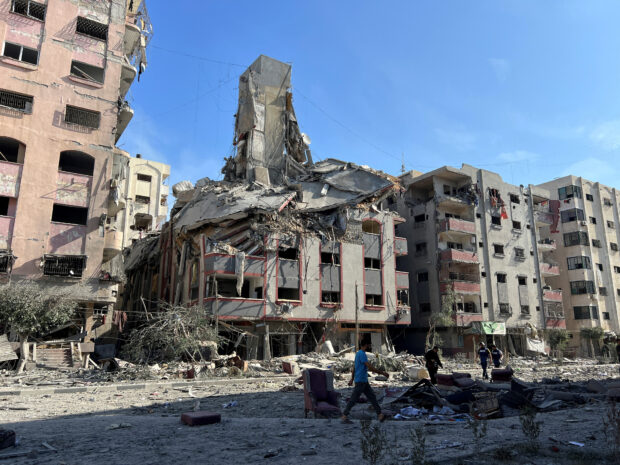Hamas says it fires on Israeli forces pressing ground assault

Damaged residential buildings are seen in the aftermath of Israeli strikes, near Al-Quds hospital in Gaza City, October 30, 2023. REUTERS/Mohammed Al-Masri
GAZA/JERUSALEM — Hamas said its militants in Gaza fired anti-tank missiles at Israel’s invading forces early on Tuesday and Prime Minister Benjamin Netanyahu dismissed calls for a halt to fighting that has deepened the Palestinian enclave’s humanitarian crisis.
Israel has expanded ground operations in Gaza as it seeks to punish the Strip’s ruling Hamas movement for a deadly gun rampage three weeks ago that Israeli authorities say killed over 1,400 people.
Witnesses said Israeli forces targeted Gaza’s main north-south road on Monday and attacked Gaza City from two directions. Israel said its troops freed a soldier from Hamas captivity, one of 239 hostages who Israel says were captured on October 7.
READ: Israel pushes deeper into Gaza and frees Hamas captive; Netanyahu rejects calls for cease-fire
The al-Qassam brigades, Hamas’ armed wing, said militants clashed early on Tuesday with Israeli forces “invading the southern Gaza axis, (including) with machine guns, and targeted four vehicles with al-Yassin 105 missiles,” referring to locally produced anti-tank missiles.
Article continues after this advertisementThe militants also targeted two Israeli tanks and bulldozers in northwest Gaza with the missiles, al-Qassam said.
Article continues after this advertisementReuters was not able to confirm the reports of fighting. Israel’s military had no immediate comment.
Gaza health authorities say that 8,306 people, including 3,457 minors, have been killed in Israeli attacks since October 7. United Nations officials say more than 1.4 million of Gaza’s civilian population of about 2.3 million have been made homeless.
The mounting death toll has drawn calls from the United States, Israel’s top ally, other countries, and the United Nations for a pause in fighting to allow more humanitarian aid to reach the enclave.
READ: Ceasefire plans stall as Israel intensifies strikes on Gaza
Netanyahu said late on Monday that Israel would not agree to a cessation of hostilities with Hamas in Gaza and would press ahead with its plans to wipe out the group.
“Calls for a ceasefire are calls for Israel to surrender to Hamas, to surrender to terrorism, to surrender to barbarism. That will not happen,” Netanyahu said in televised remarks.
Military specialists said Israeli forces are moving slowly in their ground offensive in part to keep open the possibility that Hamas militants will negotiate the release of the hostages.
The relative caution with which Israeli troops have taken and secured slices of territory in the first days of sustained ground operations in Gaza stands in contrast to the past three weeks of unrelenting air strikes on the Mediterranean enclave, as well as to Israel’s previous land offensives there.
‘Disaster on top of a disaster’
Israel’s military said it struck more than 600 militant targets in recent days in Gaza, where Palestinian civilians are in dire need of fuel, food and clean water.
The UN humanitarian office (OCHA) said that water supply through a pipeline from Israel to southern Gaza was cut off on Monday “for unknown reasons” and that an announced repair of another pipeline to central Gaza did not take place.
“At the time of writing, no water is provided to Gaza from Israel,” OCHA said on its website.
READ: Netanyahu says Gaza war entered new stage: It will be ‘long, difficult’
Significantly fewer humanitarian aid trucks have reached the besieged enclave than are required, UN officials said, and civil order has broken down with people storming UN warehouses in search of food.
That has put four UN aid distribution centers and a storage facility out of action, the United Nations agency for Palestinian refugees (UNRWA) said on Monday.
“It’s a disaster on top of a disaster. Health needs are soaring and our ability to meet those needs is rapidly declining,” World Health Organization regional emergencies chief Rick Brennan said, reiterating international calls for a ceasefire to enable a larger humanitarian operation.
Aid trucks have been trickling into Gaza from Egypt over the past week via Rafah, the main crossing that does not border Israel. It has become the main point of aid delivery since Israel imposed a “total siege” on Gaza after October 7.
The White House said it was working to get more aid trucks into Gaza.
READ: Most Palestinians in Gaza are cut off from the world
Hostages
Hamas released a video on Monday that showed three hostages seized by the Islamist movement on October 7.
The women – identified by Netanyahu as Yelena Trupanob, Danielle Aloni and Rimon Kirsht – sat side by side against a bare wall, and Aloni addressed an angry message to the prime minister.
Netanyahu condemned the video as “cruel psychological propaganda” and said Israel’s ground campaign created possibilities for rescuing the hostages.
READ: DFA official says six Filipinos returned to Gaza Strip
The conflict has led to demonstrations worldwide in support of the Palestinians, and antisemitic and Islamophobic harassment.
Biden administration officials, voicing alarm at reports of anti-Jewish incidents at US universities, met American Jewish leaders on Monday to discuss steps to counter the surge, a White House official said.
In Russia, President Vladimir Putin accused the West and Ukraine of stirring up unrest inside Russia after rioters in the predominantly Muslim Dagestan region stormed an airport to “catch” Jewish passengers on a flight from Tel Aviv.